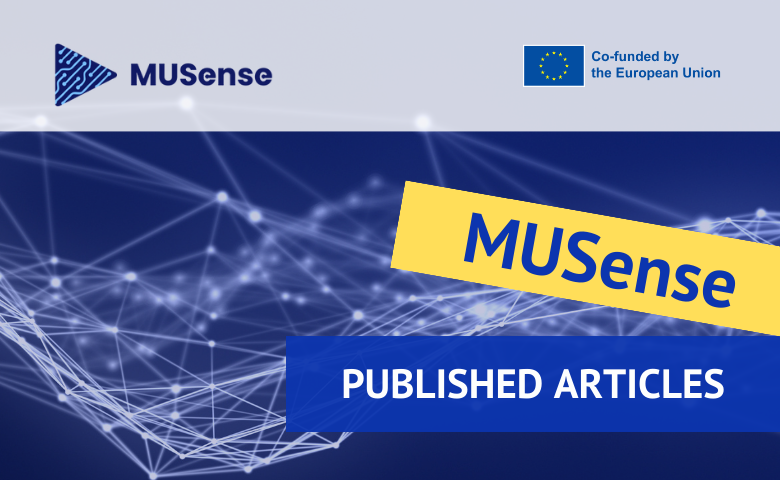The articles published under the MUSENSE project represent a concerted effort to disseminate and exploit innovative digital technologies in music and broader performance arts education. These papers aim to contribute to the advancement of educational practices by integrating virtual reality (VR), augmented reality (AR), the Metaverse, and other cutting-edge technologies. The rationale behind these publications is rooted in fostering inclusive and sustainable educational environments that leverage digital innovations to enhance learning experiences and performance outcomes.
Together, these articles from the MUSENSE project underscore a commitment to advancing educational practices through technical innovation and interdisciplinary collaboration. By disseminating insights and practical implications derived from integrating VR, AR, and the Metaverse into music and performance arts education, the project aims to empower educators and performers to navigate the digital frontier effectively. Moreover, these efforts contribute to broader discussions on inclusive education and sustainable development, positioning the MUSENSE project at the forefront of digital transformation in arts education.
Navigating Digital Frontiers in Music Education: The MUSENSE Project’s Contribution to E-Learning
I Deliyannis, Y Özarslan, I Toulis, R Longo, M Emmanouil, N Mylonas
European Journal of Contemporary Education and E-Learning
DOI: 10.59324/ejceel.2024.2(2).xx https://ejceel.com/index.php/journal/article/view/69
This journal paper explores the integration of advanced digital technologies, such as virtual reality (VR), augmented reality (AR), and the Metaverse, into music education. Through the MUSENSE project, the study investigates how these technologies can enhance the teaching and learning experience in music by providing immersive learning environments, remote collaboration, and broader access to educational resources. The research employs a mixed-methods approach, including quantitative surveys and qualitative interviews, to assess the impact of these technologies on educators and students. The findings highlight both the opportunities, such as increased engagement and innovative pedagogical practices, and challenges, including digital infrastructure disparities and the need for curriculum adaptation. The paper aligns with the 2030 Agenda for Sustainable Development, emphasizing the importance of inclusive and equitable quality education.
The primary contribution of the paper is its holistic examination of the potential of cutting-edge technologies to transform music education. It provides valuable insights and practical implications for integrating VR, AR, the Metaverse, and network performances into educational practices, addressing digital divide issues and promoting sustainable, inclusive education. The development of a customizable repository to assist educators in implementing these technologies tailored to their specific needs further represents a significant advancement in the field.
Extending the MUSENSE project from the Music Industry to the Wider World of Performance
Ioannis Deliyannis, Ioannis Toulis, Raffaele Longo, Minas Pergantis
2023/5 Digital Culture & AudioVisual Challenges Interdisciplinary Creativity in Arts and Technology, Ionian University, Corfu, Greece
https://avarts.ionio.gr/dcac/2023/en/presentations/941/
The paper explores the application of advanced digital technologies and innovative practices from the music industry to a broader range of performance arts. The MUSENSE project aims to revolutionize the approach to virtual performances by leveraging tools such as VR, the Metaverse, and 360° cameras, making these technologies accessible and beneficial to performers and educators beyond just the music industry. The project focuses on user-centered design and accessibility, ensuring the platform is adaptable and user-friendly. It provides resources, training programs, and comprehensive guidelines to equip students, teachers, technicians, and staff with the necessary skills to create engaging digital experiences. Additionally, the project seeks to identify best practices in cyber performances and develop new curricula incorporating digital, virtual, and augmented reality technologies. The ultimate goal is to foster innovative and sustainable models for digital performances, enhancing the capacity for future entrepreneurship in the digital space.
The main contribution is the extension of the MUSENSE project’s innovative digital solutions from the music industry to the broader performance arts sector. By focusing on user-centered design and accessibility, the project creates an open, adaptable, and easy-to-use platform that supports a wide range of users, including educators, students, and industry professionals. It provides valuable resources, training, and guidelines to help these users harness the potential of advanced digital technologies for virtual performances. The project also aims to develop new curricula and best practices for integrating digital, virtual, and augmented reality into performance arts education. This work significantly contributes to the discourse on digital innovation in performance arts, offering practical implications for educators and performers aiming to navigate the digital frontier effectively.
Enhancing the User Experience through Technical Innovation: The MUSense Project
Ioannis Deliyannis, Ioannis Toulis, Raffaele Longo, Minas Pergantis
2023 Higher Humanities Education in the 21st Century: Challenges and Perspectives” // Proceedings of the 18th annual International Conference, Samara, 2023. – 170p. ISBN 978-5-8428-1233-2
Samara State University of Social Sciences and Education
The paper focuses on revolutionizing music education and performance through the integration of advanced digital technologies. It outlines the MUSense project’s goal to support the music industry in adapting to virtual performance environments by developing innovative technologies and practices. The project emphasizes user-centered design and accessibility, aiming to create an open platform that is easy to use and adaptable for music students, teachers, technicians, and staff. Key features include an online repository, training programs, and comprehensive guidelines designed to provide the necessary skills and resources for creating engaging digital experiences. The main contribution of this paper is its detailed exploration of the technical aspects and interaction design of the MUSense project, offering insights into the development and implementation of user-friendly and inclusive digital tools for music education.






